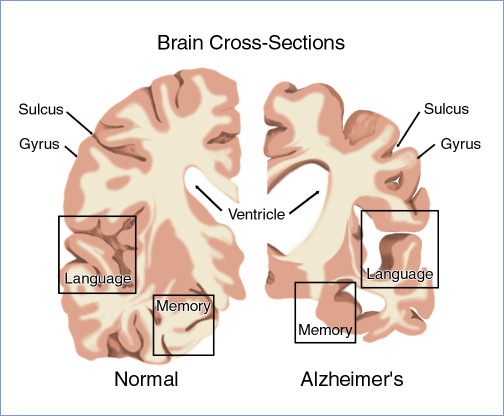Alzheimer’s Disease or Dementia is the most common type of age related cognitive disorder, which usually begins affecting individuals over the age of 65. The illness systematically destroys the brain tissue of the individual, until he/she is no longer able to function on his/her own, robbing one not only of their lifelong memories but as well of their freedom. An estimated 26.6 million individuals worldwide and 2.3 million Americans are currently suffering from Alzheimer’s and the prevalence of it continues to double every five years after the age of 60 – the likelihood of developing the disorder increases from 1% among those 60 to 64 up to 40% among those aged 85 years and older.
Although this disorder has been described in the medical community for over a century, the direct cause behind it remains unknown. Some scientists however take the approach that the origin of the degeneration is multi-causal and can even be related to diet and lifestyle. When a meta-analysis of over 500 studies was conducted some very interesting and promising trends were noted.
 Firstly it seemed that the more time the individual devoted to their cognitive health throughout their lifetime, the more likely were they to avoid developing the dementia or suffering from more advanced forms of Alzheimer’s. Consuming a Mediterranean diet and having a semi-active lifestyle also seems to act as a preventative measure. Very importantly some studies uncovered that vitamin and mineral deficiencies may be at fault for the developing and progression of the cognitive disorder.
Firstly it seemed that the more time the individual devoted to their cognitive health throughout their lifetime, the more likely were they to avoid developing the dementia or suffering from more advanced forms of Alzheimer’s. Consuming a Mediterranean diet and having a semi-active lifestyle also seems to act as a preventative measure. Very importantly some studies uncovered that vitamin and mineral deficiencies may be at fault for the developing and progression of the cognitive disorder.
A Swedish study of persons 75-years-old and older found that more than half (46 out of 78) of those diagnosed with dementia had both low levels of vitamin B12 or folate and Alzheimer’s type dementia. Several other studies have examined the effect of vitamin supplementation on Alzheimer’s disease. It appeared that the degeneration could result from too-low serum levels of vitamin B12. According to the scientists who conducted these studies repleting B12 vitamin could reverse up to 75% of the related dementias if the condition is uncovered early enough.
All mammals, including humans, are born with natural serum levels of B12 at about 2,000 pg/ml. These levels are noted to decline throughout the lifespan, often due to the ramifications of modern lifestyle choices. According to John V. Dommisse in his 1991 reports in “Medical Hypotheses” a staggering number of Alzheimer’s dementia cases are in actuality undiagnosed B12 deficiency. This common misdiagnosis occurs due to the fact that the accepted clinical sets for “normal in low-range B12 serum levels” are in fact much too low for most of the population, who eventually begin to suffer the effects of the deficiency
Dommisse writes that almost all of his patients have had B12 levels in the lowest one-third of the “normal range”, levels that he currently regards as deficient and inadequate for healthy cognitive functions. According to Dommisse when the levels of B12 were raised to the highest third of the “normal” range every single patient reported feeling better. Some patients came out of their depression or mood disorder, despite the fact that this was the only new or different therapy that they had received. In subsequent instances when B12 levels had again dropped their affective disorder apparently worsened. Dommisse is now wishing to calculate the proportion of cases of mood-disorder which may be caused or seriously affected by a B12-deficiency and what percentage remain idiopathic
Another theory suggests that vitamin B12 or folate deficiencies affect Alzheimer’s disease by influencing neurotransmitters or the levels of homocysteine in the body (this would also explain why depression is one of the emergent symptoms). Either vitamin B12 or folate deficiency can increase the levels of homocysteine in the body. Homocysteine is required in the metabolic functions of the body, but when too much of it accumulates in the bloodstream it begins to act as a neurotoxin, the effect of which causes cell death and possibly neurological conditions such as Alzheimer’s disease. The effect of B12 deficiency on homocysteine and the body will be discussed in future posts.

